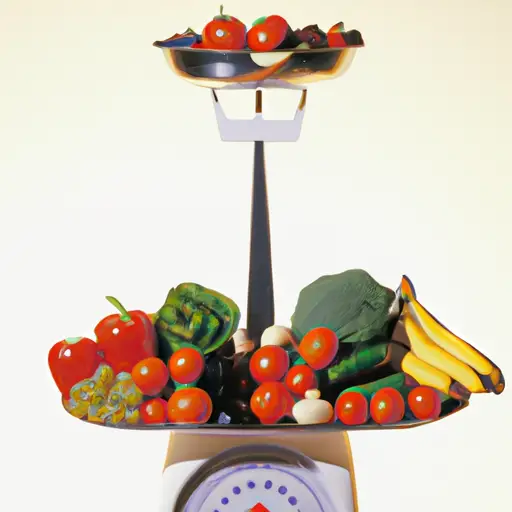The Benefits of Protein for Health
I am Protein, Your Body’s Best Friend
Hey there, I’m protein! You might have heard of me before – I’m one of the most important nutrients your body needs to function. Without me, your body simply wouldn’t be able to perform its daily tasks. But what exactly am I, and why am I so important? Let’s take a closer look.
So, what is protein? Put simply, I’m a macronutrient – meaning your body needs me in large quantities – made up of amino acids. These amino acids are the building blocks of protein, and are essential for the growth and maintenance of your body. I come in many different forms, found in a variety of foods such as meat, dairy, legumes and grains.
What are the benefits of having enough protein in your diet? Well, where do I start! Not only do I help build and repair your body tissue – think skin, hair and nails – but I also help regulate hormones, enabling your body to function in balance. Additionally, I play a crucial role in the immune system, helping to defend your body against illnesses and diseases.
But where can you find me, you might ask? Fear not, there are plenty of sources of protein to choose from. Animal sources such as meat, fish and eggs are widely recognized, but plant-based sources like beans and tofu are also excellent sources of protein. So whether you’re a carnivore or herbivore, you can get enough protein to keep your body functioning at its best.

But how much protein do you actually need? It depends on a variety of factors such as age, weight and activity levels. But the general rule of thumb is around 0.36 grams of protein per pound of body weight. However, this varies depending on individual needs, and it’s important to consult with a healthcare professional if you’re unsure.
In conclusion, protein is vital to the daily functions of your body. Whether you’re looking to build muscle, improve your immune system or just keep your body functioning as it should, including protein in your diet is essential. So next time you’re considering a meal, remember your good old pal protein.
What in the world is Protein?
Protein is an essential nutrient. It’s made up of tiny building blocks called amino acids. These blocks help our bodies grow and repair faster. Each amino acid is joined together in a chain like links in a necklace called a polypeptide chain. Different types of proteins can be created when different types of amino acids are joined together. Proteins can be found all over in the human body, including our muscles, bones, and organs.
There are many types of protein, each with their own unique composition and structure. They can be classified based on their shape, stability, and function. My favorite types include enzymes, which act as the body’s catalysts, signaling proteins, which help cells communicate with each other, and transport proteins that assist with the movement of molecules in and out of cells.
The Wonders of Protein: My Body’s Building Blocks
Let me tell you about my personal favorite macronutrient – protein! Not only does it add flavor and variety to my meals, but it’s also crucial for building and repairing the tissues in my body. But did you know that it does a lot more than that? Let’s explore the wonders of protein and what it can do for us.
Building and Repairing Body Tissue
Protein is essential for the growth and repair of my body tissues. Whenever I engage in physical activity, such as lifting weights or running, my muscles experience wear and tear. Protein helps repair this damage by providing the amino acids needed to create new muscle fibers. This is especially important for athletes and those looking to build muscle mass.
Regulating Hormones
Protein also plays a vital role in regulating hormones, which control many of the body’s processes. Hormones such as insulin and glucagon help regulate my blood sugar levels, and protein is necessary for the production of these hormones. Without adequate protein intake, my body may struggle to maintain a healthy hormonal balance, leading to various health issues.
Improved Immune System
Protein is also essential for maintaining a healthy immune system. The antibodies that help fight infections and illnesses are made up of protein, and a lack of protein can impair my body’s ability to fight off pathogens. By consuming enough protein from a variety of sources, I can ensure that my immune system operates at peak performance, keeping me healthy and strong.
In conclusion, protein isn’t just a nutrient that provides flavor and taste to my meals. It’s essential for building and repairing my body tissues, regulating hormones, and improving my immune system. So make sure to include a variety of protein sources in your diet, from both animal and plant-based sources, to ensure optimal health benefits.
Where can I get my protein fix?
There are plenty of sources of protein out there – both animal and plant-based. From beef to beans, eggs to edamame, there’s something out there for everyone.
If you’re looking for animal-based protein, meats such as beef, chicken, and fish are great sources. As a vegetarian, I often prefer plant-based options, such as tofu, tempeh, and legumes like lentils and chickpeas. As it turns out, there are plenty of plant-based options that are high in protein – so you don’t have to be a meat-eater to get enough!
One thing to keep in mind when choosing your protein sources: some foods contain more complete proteins than others. Complete proteins contain all nine essential amino acids, which our bodies need but cannot produce on their own. Animal-based proteins, such as meat, eggs, and dairy, are typically considered complete proteins. But don’t worry – as long as you’re getting a variety of plant-based protein sources, you can still get all the essential amino acids you need!
It’s also important to consider the fat content of your protein sources. While some fat is good, it’s also important to make sure you’re not consuming too much – especially if you’re trying to maintain a healthy weight. Lean meats like chicken and turkey are good options, as are plant-based options like tofu and tempeh. If you’re choosing nuts or seeds for your protein, look for unsalted options, as many pre-packaged nuts are loaded with added salt and oil.
Overall, there are plenty of options out there when it comes to getting your protein fix. Experiment with different sources to find what works best for you – and don’t be afraid to try new things!
How Much Protein Do You Really Need?
Now that we’ve established what protein is and how it benefits our bodies, let’s talk about how much we actually need. It’s a common misconception that we need a huge amount of protein to build muscle and stay healthy, but the truth is, most people only need a moderate amount. The recommended daily intake of protein varies depending on your age, sex, and physical activity level.
According to the Centers for Disease Control and Prevention, adult women need about 46 grams of protein per day, while adult men need about 56 grams. However, if you’re engaging in heavy physical activity, you may need more. It’s important to note that this is just a general guideline and your individual needs may vary.
If you’re an athlete or regularly engage in high-intensity exercises like weightlifting or running, you may need up to 1.2-1.7 grams of protein per kilogram of body weight. However, most people can easily meet their daily protein needs through a balanced diet that includes a variety of protein sources.
Conclusion
“All in all, protein is the way to go!” As I wrap up this blog on protein, I want to stress the importance of getting the right amount in your diet. Whether you are an athlete or just someone trying to maintain a healthy lifestyle, protein is essential. As I mentioned earlier, it helps build and repair body tissues, regulates hormones, and improves your immune system. But where can you get protein? There are plenty of sources! You can choose from animal sources like meat, eggs, and dairy or plant sources like nuts, beans, and quinoa. Just be sure you’re getting the right amount for your body. According to the Dietary Guidelines for Americans, the average adult needs between 46-56 grams of protein per day. However, it’s important to note that everyone’s needs may vary based on age, sex, weight, and activity level. So, be sure to consult with a doctor or registered dietitian to help you figure out what’s best for you. And make sure to check out this amazing resource on macronutrients in a healthy diet for more information!
But that’s not all, folks! It’s important to remember that protein is just one piece of the puzzle when it comes to a healthy diet. Don’t forget about your carbs and fats, too! Macronutrients all work together to keep your body and mind functioning at their best. So, don’t skimp on any of them!
So, when it comes to protein, be sure to choose a variety of sources and keep an eye on how much you’re eating. Your body will thank you for it in the long run!






